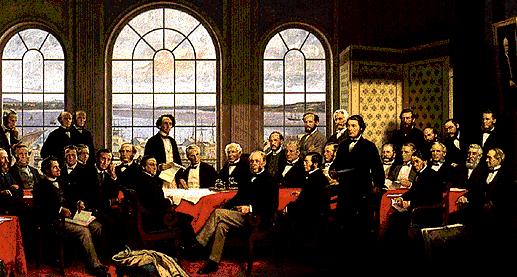
While everyone is probably familiar with John Manley and Preston Manning, politicians who made their mark a hundred years ago are at quite a disadvantage in a tournament like this. History is written about the winners, after all. In last year’s contest, the final match was between John A. MacDonald and Wilfrid Laurier so, clearly, there were some good Prime Ministers back in the day. It should therefore stand to reason that a few other 19th century politicians would have made fine leaders for this country too.
Joseph Howe
Appears to have Scott Brison’s vote in this tournament. Howe was a strong believer in freedom of the press and his influence could be felt on the Nova Scotian government over many years. Howe was a vicious opponent to confederation and after he failed to prevent it, he led a temporary ad hoc rainbow coalition of MPs from Nova Scotia who opposed the agreement.
George Henry Murray
The Cal Ripken of provincial politics with a record 27 year consecutive Premier streak. Clearly he did something right. Or maybe he just sold out to the big money potato lobby. Of note, George Murray lost five elections before finally being elected to the provincial legislature (so he’s really Tony Clement’s role model).
Samuel Tilly
Tilly was New Brunswick Premier and a strong supporter of confederation. It was Tilly’s suggestion to use “from sea to sea” as our motto, so he’s the one to blame for the 30 letters to the editor in the Globe I see every day about changing our motto to “sea to sea to sea”. Tilly entered federal politics in 1867 and served for over 7 years as Minister of Finance (never once running a balanced budget – shame!).
Henri Bourassa
Bourassa is certainly not a member of the Michael Ignatieff school of foreign policy and he resigned as a federal Liberal in 1899 because of a disagreement over Laurier’s decision to send troops to the Boer War (he felt it was a snap vote with no real time for debate). Bourassa founded Le Devoir and used it as a vehicle to criticize many of Laurier’s pro-British decisions and helped contribute to Laurier’s defeat in 1911 (leading to the election of a pro-British Tory government – d’oh!). Bourassa, not surprisinglym fought hard against conscription in the first world war and developed a reputation as the defender of the French Canadian people.
George Etienne Cartier
This is an individual who I really feel is worthy of a final 4 appearance in this tournament and he’d certainly make for a worthy winner. Carter was MacDonald’s right hand man in the pre-Confederation Parliament and helped set up the grand coalition with George Brown. He was a fierce advocate of confederation and deserves much of the credit for bringing Quebec onside with the idea (or, “most of the blame”, if you prefer). According to my good friends at wikipedia, he also:
played a leading role in pushing through legislative reform that effectively abolished the semi-feudal seigneurial system of land ownership in Lower Canada, turning its legislative council into an elected body of representatives, and pushed successfully for the adoption of the Civil Code within the province.
Cartier was one of MacDonald’s most trusted Ministers and he often sat in for the PM when John A. was “under the weather”. In other words, he was the Prime Minister of Canada. He negotiated the deals to bring Manitoba and BC into Canada, as well as the construction of the trans-Canada railway.
Edward Blake
Edward Blake is the only federal Liberal leader to never become Prime Minister. So, consider him the Liberal counterpart to Stanfield…or Drew…or Bracken…or Manion…or, well, you get the picture. Blake became Ontario Premier in 1871 and led the original Mad as Hell tour against John A. MacDonald’s pacific scandal, helping to bring down the PM. He became Liberal leader in 1880 and “never lost his Clear Grit style and ability to bore an audience for hours on end with pedantics”.
George Brown
Founder of the Toronto Globe (1851 headline: “LIBERAL-CONSERVATIVES SURGE AHEAD IN SOUTHERN ONTARIO!”). Brown wrote often in opposition of slavery in the US south and in support of representation by population in Canada. As the leader of the clear grit party, he supported the separation of church and state and the annexation of the north west territories. His joining of the Great Coallition was also instrumental in the coming into being of confederation. He was the unofficial leader of the federal Liberals from 1867 to 1873.
Oliver Mowat
Mowat was an ally of George Brown’s and a member of the Great coalition. As Ontario Premier for 24 years, he fought hard for provincial power and decentralization, often complaining about the “$23,000 gap.” He also oversaw a lot of democratizing measures in Ontario and tried to ease tensions between Catholics and Protestants. Mowat was the equivalent of Laurier’s running mate in the 1896 election, helping the Liberals break through and form government.